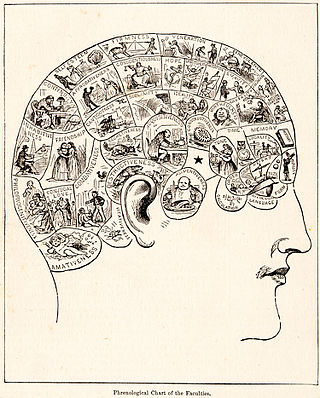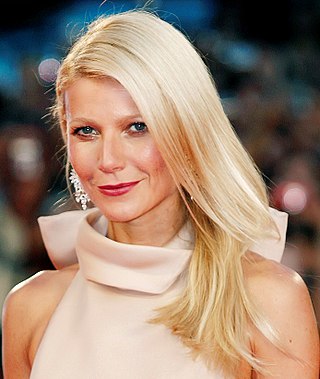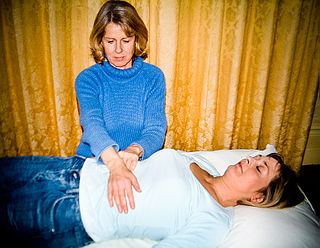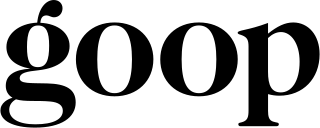
Pseudoscience consists of statements, beliefs, or practices that claim to be both scientific and factual but are incompatible with the scientific method. Pseudoscience is often characterized by contradictory, exaggerated or unfalsifiable claims; reliance on confirmation bias rather than rigorous attempts at refutation; lack of openness to evaluation by other experts; absence of systematic practices when developing hypotheses; and continued adherence long after the pseudoscientific hypotheses have been experimentally discredited. It is not the same as junk science.

Gwyneth Kate Paltrow is an American actress and businesswoman. She is the recipient of various accolades, including an Academy Award, a Golden Globe Award, and a Primetime Emmy Award.

Reiki is a Japanese form of energy healing, a type of alternative medicine. Reiki practitioners use a technique called palm healing or hands-on healing through which, according to practitioners, a "universal energy" is transferred through the palms of the practitioner to the patient, to encourage emotional or physical healing.

Ear candling, also called ear coning or thermal-auricular therapy, is a pseudoscientific alternative medicine practice claiming to improve general health and well-being by lighting one end of a hollow candle and placing the other end in the ear canal. Medical research has shown that the practice is both dangerous and ineffective and does not functionally remove earwax or toxicants, despite product design contributing to that impression.

Andrew Fried is an American documentary filmmaker, producer and director, and the president of Boardwalk Pictures. Fried is known for producing documentary films and television series, such as Chef's Table, The Black Godfather, Last Chance U, 7 Days Out, My Love, Men in Kilts, Booktube, Street Food, Cheer, Val and The Goop Lab with Gwyneth Paltrow. He directed the 2020 documentary film We Are Freestyle Love Supreme.
Frank Lipman is a South African celebrity doctor, acupuncturist and alternative medicine advocate who resides in New York.
Netflix is a subscription streaming service owned by the American company Netflix, Inc. Launched on August 29, 1997, it initially offered DVD rental and sale by mail, but the sales were eliminated within a year to focus on the DVD rental business. In 2007, the company began transitioning to its current subscription streaming model. Since its launch, the company was subject to numerous criticisms, the basis of which range from its business practices and workplace culture to issues with the service it provides, including content issues, lack of close captioning and pricing. This article provides an overview of key criticisms the company has faced.

Timothy Allen Caulfield is a Canadian professor of law at the University of Alberta, the research director of its Health Law Institute, and current Canada Research Chair in Health Law and Policy. He specializes in legal, policy and ethical issues in medical research and its commercialization. In addition to professional publications, he is the author of several books aimed at the general reader and host of a television documentary series debunking pseudoscientific myths. He is a fellow of the Committee for Skeptical Inquiry and the Pierre Elliott Trudeau Foundation.

Goop is a wellness and lifestyle brand and company founded by the American actress Gwyneth Paltrow. It was launched in September 2008 as a weekly e-mail newsletter providing new age advice, such as "police your thoughts" and "eliminate white foods", and the slogan "Nourish the Inner Aspect". Goop expanded into e-commerce, collaborating with fashion brands, launching pop-up shops, holding a "wellness summit", launching a print magazine, a podcast, and a docuseries for Netflix.
Correactology is a system of alternative medicine based on the unsubstantiated claim that "regulating the density of cells" in the body improves a wide range of ailments. An offshoot of chiropractics, the treatment was developed in Sudbury (Ontario) in 2002 by brothers Michael and Allan Lapointe. It has been branded a pseudoscience by critics and the sole training program in the subject has been taken to court by former students.
Explained is an American documentary television series on the streaming service Netflix. The show is produced by Vox Media and is based on Vox's previous YouTube video series which followed a similar format. The show's episodes averaged between 16 and 24 minutes, with each focusing on a different topic. Each episode is voiced by a different guest narrator. The series premiered on Netflix on May 23, 2018 with episodes released on a weekly basis. The second season premiered on September 26, 2019 and the third season on July 16, 2021.
Afflicted is an American documentary television series on Netflix. The show follows individuals suffering from various chronic diseases and illnesses, seeking treatment and cures. Netflix released all seven episodes of its first season on August 10, 2018.
Anthony William Coviello, known professionally as Anthony William or the Medical Medium, is a self-proclaimed medium who offers pseudoscientific health advice based on alleged communication with a spirit. He authors books and offers advice online on forums such as Gwyneth Paltrow's Goop column and his own website. William believes that the Epstein-Barr virus is responsible for multiple ailments, including cancer. He claims to be the originator of the lemon juice in water morning detox as well as celery juicing, which he claims can offer many health benefits. Critics allege that he is practicing medicine without a license and that he has, at times, improperly solicited positive Amazon reviews for his books.

The Goop Lab is an American documentary series about the lifestyle and wellness company Goop, founded by American actress Gwyneth Paltrow, who acts as host and executive producer of the series. The series premiered on January 24, 2020 on Netflix.

Cheer is an American sport television docuseries airing on Netflix starting in January 2020. The six-part series follows the nationally ranked forty-member Navarro College Bulldogs Cheer Team from Corsicana, Texas, under the direction of coach Monica Aldama, as they prepare to compete in the National Cheerleading Championship held annually in Daytona Beach, Florida. The episodes focus especially on five individual Cheer Team members and include elements of the history of cheerleading, including the formation of the National Cheerleaders Association (NCA).

Kelly Brogan is an American author of books on alternative medicine who has promoted conspiracy theories and misinformation about discredited medical hypotheses.

Down to Earth with Zac Efron is an American web documentary series that premiered on Netflix on July 10, 2020. It stars Zac Efron and Darin Olien, who also act as executive producers of the series. The documentary revolves around Efron and his travels around the world to France, Puerto Rico, London, Iceland, Costa Rica, Peru, and Sardinia, and focuses on themes of travel, life experience, nature, green energy and sustainable living practices. Critics describe it as light in tone, but heavy in questionable health advice and pseudoscience.

High Score is a Netflix docuseries created by France Costrel. It features stories and interviews with the developers and creators of early video games. The series first premiered on August 19, 2020.

Deaf U is an American reality television program on Netflix that follows a group of deaf and hard of hearing college students who attend Gallaudet University, a federally chartered private university for the education of the deaf and hard of hearing that is located in Washington, D.C. Among the series' executive producers is deaf activist, model, and actor Nyle DiMarco. According to DiMarco, the goal of the series is "to show deaf people as humans, from all walks of life."

Surviving Death is a docu-series directed by Ricki Stern about near-death experiences and beliefs in life after death, and psychic mediumship. Its first season of six episodes was released on Netflix on 6 January 2021. The series is based on the 2017 book Surviving Death by journalist and paranormal enthusiast Leslie Kean.














